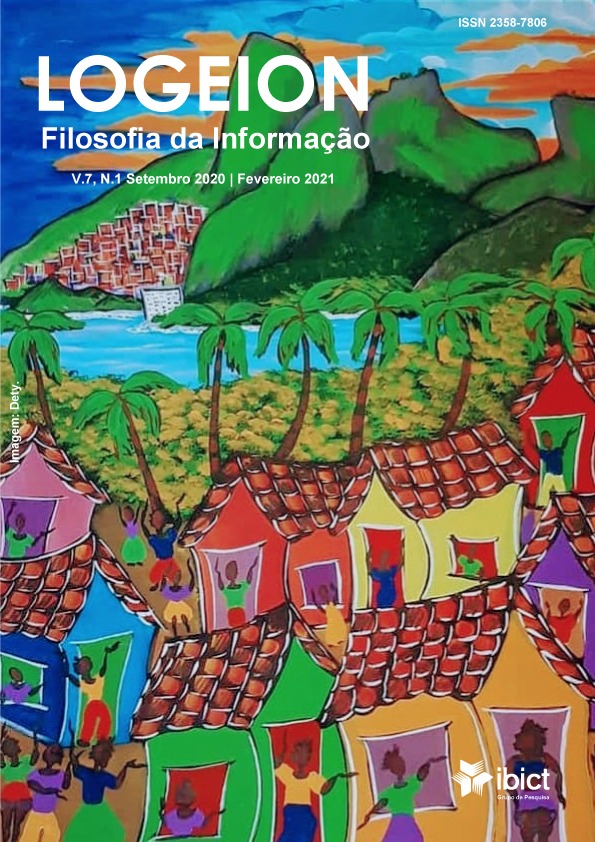Post-truth, fake news and other drugs
living in times of toxic information
DOI:
https://doi.org/10.21728/logeion.2020v7n1.p8-27Keywords:
Toxic information, Post-truth, Fake news, Toxic informational environment, Hate speechesAbstract
The advent of the network society has promoted significant changes in the experience-with-the-world. In recent years, the growing toxicity in the information environment has been observed, marked both by the toxic experience of information that circulates legally on social networks and by information that intoxicates individuals and groups. The objective is to discuss, in times of post-truth and non-stop society, the toxic aspect of information, which by making the information environment toxic, sickens individuals and democratic societies, by weakening empathy for others and jeopardize the very idea of democracy and shared life in a democratic way. The proposal is to discuss intoxication by information not by excess, but by what I mean “toxic information”, the toxic aspect of the information and the toxic informational environment based on Hate Speech. To this end, the deconstruction of experiences of democratic states will be considered by increasing the circulation of hate speech and fascist hate speech; the growth of disinformation; the increase in the circulation of fraudulent news (Fake news) and false news (for example, those not endorsed by scientific knowledge, such as terraplanism, the idea of white supremacy); robots and algorithms.
Downloads
References
ARENDT, H. Entre o passado e o futuro. São Paulo: Perspectiva, 2009.
BENITES, A. Checagem no WhatsApp é trabalho mais nobre para conter fake news. El país Brasil, São Paulo, 28 set. 2018. Disponível em: https://brasil.elpais.com/brasil/2018/09/27/politica/1537999429_399901.html. Acesso em: 3 set. 2020.
BIRD, J. The Reuters guide to good information strategy. London: Reuters, 1996. Disponível em: http://jmab.planetaclix.pt/GesInf/Aula5/The_Reuters_Guide_to_Good_Information_Strategy.pdf. Acesso em: 3 set. 2020.
BRUGGER, W. Proibição ou proteção do discurso do ódio? Algumas observações sobre o direito alemão e o americano. Revista de direito público, Brasília, DF, v. 15, p. 117-136, jan./mar. 2007.
BRUM, E. Exaustos-e-correndo-e-dopados. El país Brasil, São Paulo, 04 jul. 2016. Disponível em: https://brasil.elpais.com/brasil/2016/07/04/politica/1467642464_246482.html Acesso em: 07 set. 2016.
BUCCI, E. Pós-política e corrosão da verdade. Revista USP, São Paulo, n. 116, p. 19-30, 2018.
CRARY, J. 24/7: capitalismo tardio e os fins do sono. São Paulo: Cosac Naify, 2014.
FERREIRA, G., SOARES, J.P. Como funciona a máquina de WhatsApp que pode eleger Bolsonaro. Época, Rio de Janeiro, 24 out. 2018. Disponível em: https://epoca.globo.com/como-funciona-maquina-de-WhatsApp-que-pode-eleger-bolsonaro-23180627. Acesso em: 03 mar 2019.
GRAGNANI, J. Um Brasil dividido e movido a notícias falsas: uma semana dentro de 272 grupos políticos no WhatsApp. BBC News Brasil em Londres. 09 out. 2018. Disponível em: https://epocanegocios.globo.com/Brasil/noticia/2018/10/um-brasil-dividido-e-movido-noticias-falsas-uma-semana-dentro-de-272-grupos-politicos-no-whatsapp.html. Acesso em: 10 out. 2018.
GRAGNANI, J. Exclusivo: investigação revela exército de perfis falsos usados para influenciar eleições no Brasil. BBC News Brasil em Londres. 08 dez. 2017. Disponível em: https://www.bbc.com/portuguese/brasil-42172146. Acesso em: 09 dez. 2017.
GRAGNANI, J. Por que o Brasil se transformou em terreno fértil para a difusão de notícias falsas durante as eleições. BBC News Brasil em Londres. 03 nov. 2018. Disponível em: https://www.bbc.com/portuguese/brasil-45978191 Acesso em: 05 nov. 2018.
HAN, B. A sociedade do cansaço. Petrópolis: Vozes, 2015.
KALIL, I. O. Qual o poder do WhatsApp? Quem são e no que acreditam os eleitores de Bolsonaro. Blog da Boitempo, São Paulo, 23 out. 2018. Disponível em: https://blogdaboitempo.com.br/2018/10/23/qual-o-poder-do-whatsapp-quem-sao-e-no-que-acreditam-os-eleitores-de-bolsonaro/. Acesso em: 16 nov. 2018.
MARTINS, A. C. L. Discurso de ódio em redes sociais e reconhecimento do outro: o caso M. Revista Direito GV, São Paulo, v. 15, n. 1, p. 1-30, jan./abr. 2019. Disponível em: http://dx.doi.org/10.1590/2317-6172201905. Acesso em: 3 set. 2020.
MELLO, P. C. Empresários bancam campanha contra o PT pelo WhatsApp. Folha de São Paulo, São Paulo, 08 out. 2018. Disponível em: https://www1.folha.uol.com.br/poder/2018/10/empresarios-bancam-campanha-contra-o-pt-pelo-WhatsApp.shtml. Acesso em: 08 out. 2018.
MELLO, P. C. Por que os brasileiros deveriam ter medo do gabinete do ódio. New York Times. New York, 04 ago 2020. Disponível em: https://www.nytimes.com/pt/2020/08/04/opinion/international-world/bolsonaro-gabinete-do-odio.html. Acesso em: 05 ago. 2020.
ONDA de nacionalismo está por trás de fake news na Índia, mostra pesquisa inédita da BBC. BBC News Brasil, São Paulo, 12 nov. 2018. Disponível em: https://www.bbc.com/portuguese/internacional-46183531. Acesso em: 14 dez. 2018.
ORTELLADO, P.; RIBEIRO, M. M. Levantamento inédito revela sites e páginas no Facebook que podem influenciar a eleição com fake news. Época, Rio de Janeiro, 28 ago. 2018. Disponível em: https://epoca.globo.com/levantamento-inedito-revela-sites-paginas-no-facebook-que-podem-influenciar-eleicao-com-fake-news-23005004 . Acesso em: 28 ago. 2018.
PÊCHEUX, M. Semântica e discurso: uma crítica à afirmação do óbvio. Campinas: UNICAMP, 1997.
SANTAELLA, L. A pós verdade é verdadeira ou falsa? Barueri, SP: Estação das Letras e Cores, 2018. Disponível em: https://pt.scribd.com/document/465534062/A-Pos-Verdade-e-Verdadeira-Ou-Falsa-Lucia-Santaella. Acesso em: 22 mai 2019.
SARMENTO, D. A liberdade de expressão e o problema do hate speech. Rio de Janeiro: Lumen Juris, 2006.
SINDICATO DOS PROFESSORES DE MINAS GERAIS – SIMPRO-MG. Excesso de informação gera angústia e pode afetar a memória. Jornal Extra-Classe, Belo Horizonte, a. 26, n. 117, nov. 2005/jan. 2006. Disponível em: http://www.sinpromg.org.br/jec117saude.html. Acesso em: 16 out. 2006.
WEINBERGER, D. Is there an echo in here? Salon, New York, 21fev. 2004. Disponível em: www.salon.com/2004/02/21/echo_chamber/. Acesso em: 3 set. 2020.
Downloads
Published
Issue
Section
License
Copyright (c) 2023 Logeion: Filosofia da Informação

This work is licensed under a Creative Commons Attribution-NonCommercial-ShareAlike 4.0 International License.
The journal is published under the Creative Commons - Attribution - Noncommercial - Share Alike 3.0 Brazil.
The published work is considered collaboration and therefore the author will not receive any remuneration for this as well as anything will be charged in exchange for publication.
All texts are responsibility of the authors.
It’s allowed partial or total reproduction of the texts of the magazine since the source is cited.














